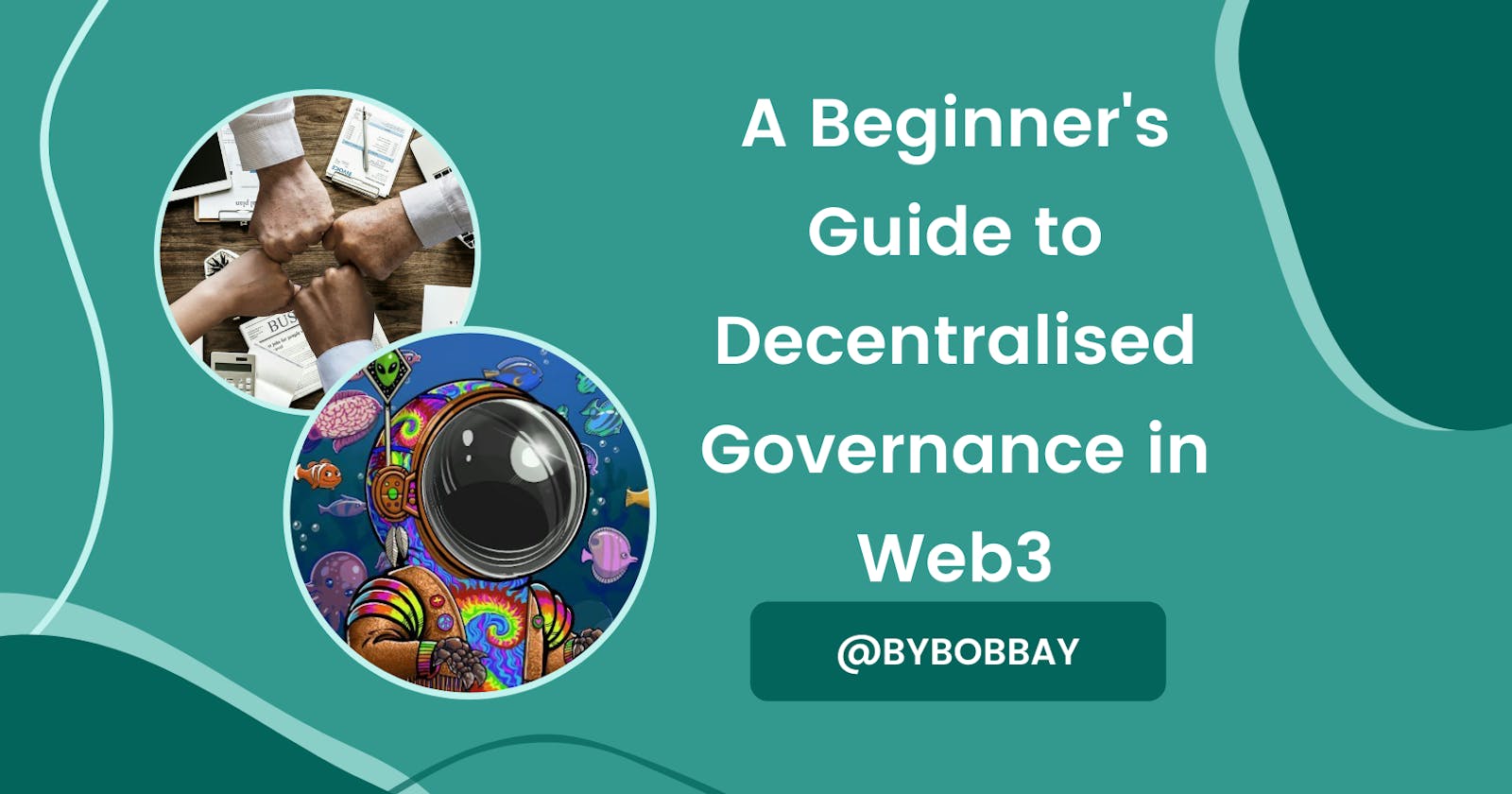DAOs have been on fire for the past year, and right now, a new DAO is being built every week, but are they actually DAOs?
In this post, we will dive deeper into DAOs and decentralised governance to understand what it is and how governance plays a key part in DAOs. We will also go through the governance process in a DAO and highlight some issues we have noticed.
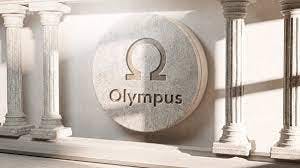
DAO stands for Decentralised Autonomous Organisation.
Decentralised: Operations and decision making within an organisation are shared out within the team rather than a few members making the critical decisions. Everyone gets to have an ‘equal’ say.
Autonomous: Having the capability to govern oneself.
Organisation: A collection of people with an aligned mission
Decentralised governance in DAOs is crucial in what makes a DAO a DAO. Right now, governance may not be perfect, but many people misunderstand or toss it aside when governance is one of the biggest reasons DAOs can function as a DAO.
Decentralised governance means that everyone gets a say on how an organisation is run, rather than the CEO or shareholders making an important decision for a business.
When users are invested in a company and want to see it do well, then maybe the users will have a great deal to say that could positively impact the company, and that is where decentralised governance comes into play.
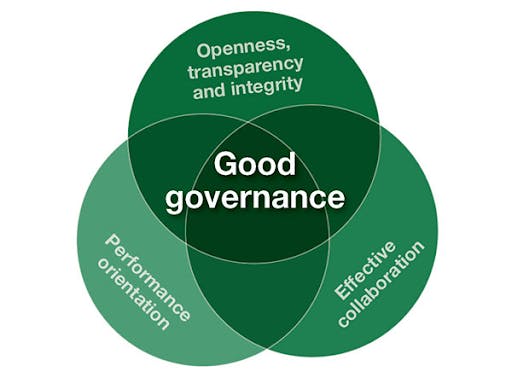
Decentralised governance requires that each major decision that affects a DAO undergo a proposed format that we will dive deeper into within this post to be implemented in the DAO.
What is governance?
In the traditional business sense, governance is when a board of directors or management team will handle the significant decisions. This means that depending on the size of the board, an entire company's fate could rely on the judgment of 10-20 people. Those elected to the board are those with experience. Sometimes reputation can play a small role, but the experience is the deciding factor.

In Web3, it is a different story. It has become a fundamental mission for people to control what is theirs and have a more significant say in how protocols run.
- We have control of our assets in non-custodial wallets.
- NFTs as proof of ownership.
- Governance tokens influence how protocols are run.
Decentralised governance means anyone who holds the token of a protocol can have an influence.
I.E. If I held the token of Uniswap, UNI, I could vote on proposals like the ones you see below.
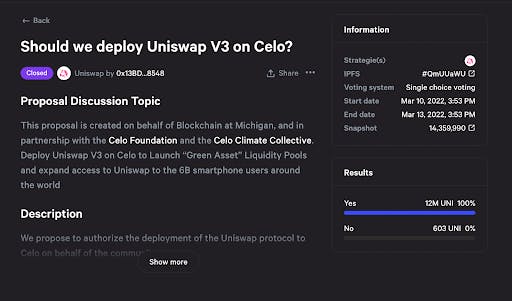
This is a significant change from the traditional sense. Now any investor, small, medium or large, can impact how the business runs and its direction. This varies from each DAO, but you can influence treasury management, use of funds and hiring etc.
This concept of governance is public and transparent for everyone to see, so if someone tries to act maliciously through governance, we can identify this act and attempt to stop it. Sometimes, a few slips like BUILD finance and Yuan finance have had hostile takeovers via governance.
Why do we need governance?
One product of Consensys, Infura, was restricted in certain countries. Those in the affected geographical location could not access DeFi apps. No access to a DeFi app means no access to your stored money.
If the same decision were to go through a DAO, maybe it would have been met with a lot of pushback, as many users are based worldwide and could have an open say of why it is unfair to implement such a thing.
It is essential to highlight that not everything needs to be a DAO, but there is a great time when a DAO can be helpful. In running a business, the company's bank accounts and whatnot are generally private, and people can’t be sure where money is going.
An example of this is the WeWork CEO who was spending crazy amounts of money, which forced the company to lose a lot of revenue and drop in a massive valuation from $50 billion to $8 billion. That WeWork CEO had been using the company money on private jets and other expensive activities while the company was losing money and failing. However, if this were a DAO, maybe this could have changed out differently.
As a DAO, all financial transactions are public and recorded, making it easy to identify who is effectively spending money and who is milking it.
In a traditional business model, CEOs can have the final say regardless of the entire team. In contrast, this is the complete opposite in DAOs. There are no CEOs, and there is no final say. There is only what the community says. Along as 51% of the community is not compromised, DAOs will avoid malicious acts by those who aim to dry the DAO of money.
As a DAO, for any significant amounts of money being spent, it would have to be proposed why this money needs to spend and how it will be spent. Unlike in a business, where a few bad actors in a business could lead to the demise of a company, this is different in a DAO. Through governance, we can highlight critical concerns and attempt to prevent them from happening and highlight any wrongdoings as the blockchain is entirely public.
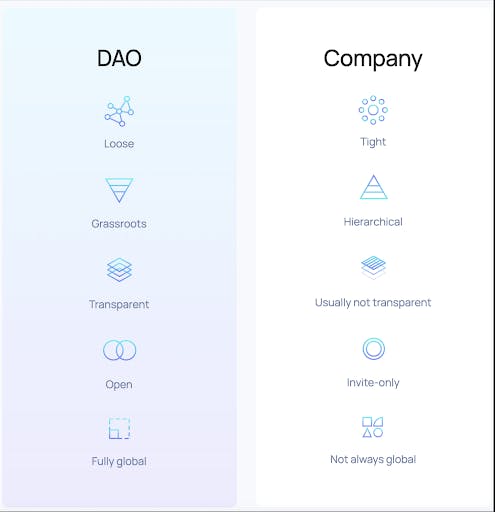
This transparency within DAOs makes it easier for active participants to influence because people can learn about the finances of the DAO and identify where improvements can be made.
How does governance work?
Governance within a DAO generally follows the following framework, but each DAO works in its way.
- Informal discussions in discord/telegram (can be skipped)
- Formal discussions will take place on a forum like discourse.
- Review the formal discussion and present the proposal on a forum, with a vote.
- Depending on the nature of the proposal, then it will enter a soft or hard vote.
This is a very rough overview, but there are a lot of conversations in-between these steps, but these are the main steps.
Governance follows a process and works differently in each DAO, but a few core concepts and tools are always generally used.
Discord or telegram for informal conversations
This is where initial ideas will be spoken about, and if it gathers enough traction, they can be refined and presented in Discourse as the next step.
This is a great way to talk about ideas in their early stage and identify if anyone else in the DAO is working on a similar project. It is a great way to gauge whether others are interested in supporting the potential proposal.
Discourse as a governance forum
This will be used to discuss an idea in a more formal conversation. The conversation that takes place on a forum is much easier to follow compared to a discord channel that has thousands of messages.
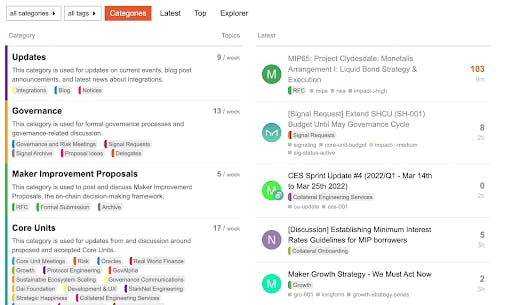
The screenshot above is of the MakerDAO forum. Discussions are organised more coherently and make it easier for new people to navigate, especially compared to discord.
While talking on a forum, people follow a template and articulate themselves in a more organised manner, making it easier to have serious discussions. Initially, you can propose an idea as a Request For Comment (RFC) or as a Forum Signal Request to gather people's opinions and identify whether it is worth pursuing.
So after discussions on the forum, which can take days to weeks or even months, the forum post is reviewed and passed on to a forum vote. It is ubiquitous to review and update the proposal. Once an idea has some backing behind it, then the next step is to formalise it into a more cohesive format for people to understand the concept and how it provides value.
For MakerDAO, that is something that they call Maker Improvement Proposals (MIP), and for Aave, that is Aave Improvement Proposals (AIP). Initially, MIPs or AIPs can be posted as drafts and classified as Work In Progress (WIP) to gather more opinions before formally submitting.
This is an excellent path to follow as many members may only vote when it is a formal proposal. These RFCs and WIPs ensure that the idea has hopefully been through a few iterations before formally submitting it.

Once the MIP or AIP is at a forum vote, it can be a simple ‘yes’ or ‘no’ in the governance forum. Or it can be more complicated with a variety of options. Anyone who has a forum account can vote yes or no.
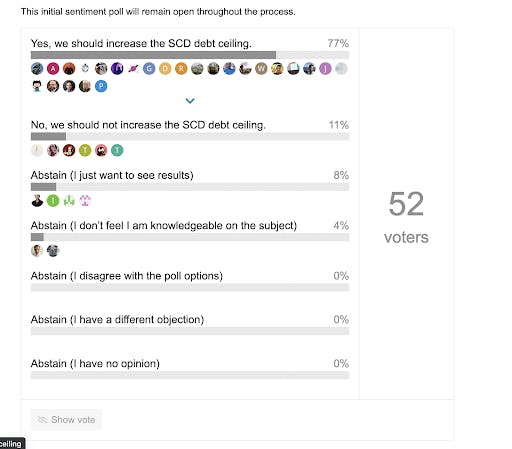
This example is from the MakerDAO forum. This was a forum signal request to identify opinions and whether further action should be taken. As you can see, 77% thought that a change should be made, so other action will be taken to create a MIP.
If a MIP passes a forum vote, it will move onto an on-chain or off-chain vote. In this example, you can see that the quorum was reached, and it was agreed upon to move the proposal to Snapshot.
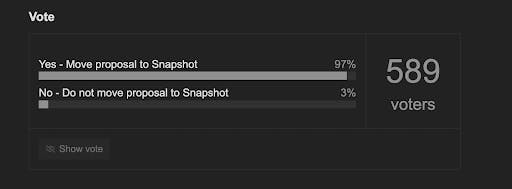
Few tips for governance forums
Updating your proposal (when necessary) can display the important skill of reflection. This is important in a decentralised world. People will respect those who take the time to think about their proposals and understand what they can do to improve them.
Someone who is headstrong and does not consider other people's opinions valid will have a hard time pushing through governance. An essential part of governance is fostering good relationships within the protocol, and taking feedback on board is an excellent way to show your open-mindedness.
On-Chain | Off-Chain voting
Votes using tokens can occur on Snapshot or Tally. Snapshot is used for off-chain voting (soft vote). Tally is used for on-chain voting (hard vote).
Snapshot
Off-chain voting means that you are not voting on the blockchain, as this can be costly. Due to this cost of voting on-chain, off-chain voting on snapshot became more popular for people as it was gasless (free) and had the required amount of tokens or NFT to vote.
This was different to governance forum voting as anyone could create multiple accounts, and since it was not token gated, anyone could vote using duplicate accounts.
However, it is possible to bypass this on Snapshot by simply creating multiple Metamask accounts and moving your tokens around, so those with more money could take advantage of this loophole.
This caters to the idea of plutocracy, as they can use their power to gain more control and financial gain. These are some of the limitations of off-chain voting, but it is still better than a forum vote, where people could create multiple accounts without the requirement of holding a token.
Developer_DAO currently votes on Snapshot, and we use our NFT as the basis for a vote. One NFT = One vote
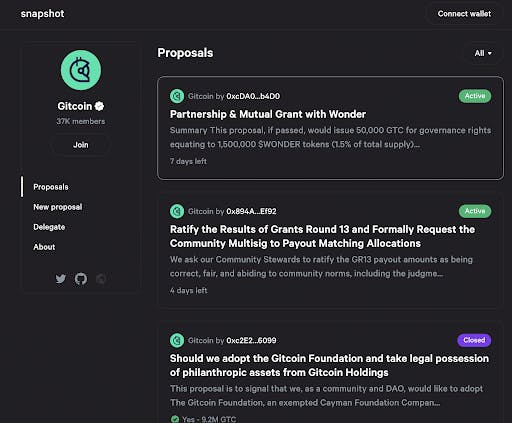
Here is a view of Gitcoin’s snapshot summary. You can see the proposals, past and active. It is easy to navigate through Snapshot and see the results of each poll. It clearly shows how many people voted and whether it passed.
Tally
Tally is used for on-chain voting.
Every time you vote on a proposal that requires a transaction, that puts your vote on the chain, which is where the cost comes from. Since Tally currently runs on the Ethereum blockchain, which is open to high gas fees, it can isolate users with fewer tokens and less money to spend on fees to vote.
This also heightens the discrepancies between the average users and whales. Whales are more likely to vote on proposals on Tally as money is less of an issue for them, whereas the average user may not be able to afford those continuous gas fees.
Fortunately, on-chain voting is mainly used for significant changes to a protocol, such as technical changes to a smart contract or treasury management, so the votes are not as frequent.
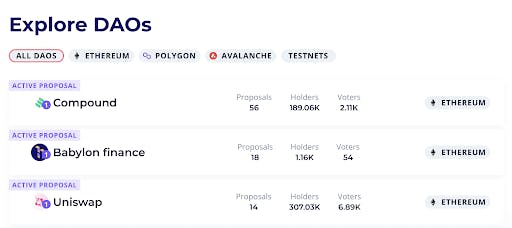
Future of on-chain voting
Snapshot has been working on Snapshot X, which is on-chain voting but on Layer 2’s, which will significantly reduce the cost of voting (potentially being free) whilst remaining on-chain. It is not out yet, but it is worth keeping an eye on, especially if you are interested in governance.
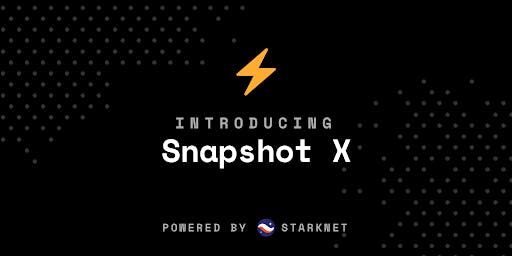
This framework is being built on Starknet, a layer 2 ZK-rollup. It will be 50x-100x cheaper to vote on Snapshot X than it is to vote on-chain on Ethereum. This reduced cost to vote on-chain can increase the percentage of voters, decreasing the gap between whale voters and an average user.
What are some key issues in governance?
Everyone in Web3 loves the concept of a DAO. However, a DAO in practice is another world, and it requires a lot of work and understanding to function.
Decentralised governance means giving power back to the people, but sometimes it is too much responsibility, and people do not possess the time or understanding actively participate. It’s essential to recognise that governance is a rabbit hole to get lost. I will discuss some of the critical issues on a superficial level in this post but will consider expanding on them more in the future.
Voter apathy
This is a lack of interest amongst token holders. A lot of token holders do not vote at all. But who is going to be the most active member in governance then?
Probably those who believe in the project a lot or those malicious actors who want to alter the system for selfish reasons such as financial gain.
There are not a lot of incentives to be an active voter, especially when you consider the amount of time spent reading proposals and their backgrounds. It can become a very time-consuming task, and without these extra incentives, you may become disinterested over time.
This also begs whether the holders who do not vote get to become ‘free loaders’ as they piggyback on the efforts of those who actively participate. This is why incentives should be considered an option for those who vote, and right now, MakerDAO does pay delegates who vote based on their performance, but they do not reward individual members.
Delegates
Delegations are people who have been elected to vote on a token holder's behalf. This reduces the number of holders who need to vote actively and instead rely on an individual to vote on their behalf.
You always have control of your tokens. You are simply delegating your token power to another individual, not control of your asset.
I.E. Steve delegates his 100 MKR voting power to Bob
Bob can now use Steve’s 100 MKR voting power to vote on Steve’s behalf. But Steve will always retain his MKR and has control over it. Steve has only delegated his power to Bob.
People will generally delegate to those individuals who are highly respected or well-known individuals. Sometimes it can be a popularity contest, which you would like to avoid because it is important to delegate to those individuals or teams who are well-versed in topics compared to a memer on Twitter with 100k followers.
Another issue with delegates is inactivity. If delegates are inactive, there can be a lot of voting power wasted. One example of this is Compound Finance. ¾ of compound delegates have been inactive in the past year.
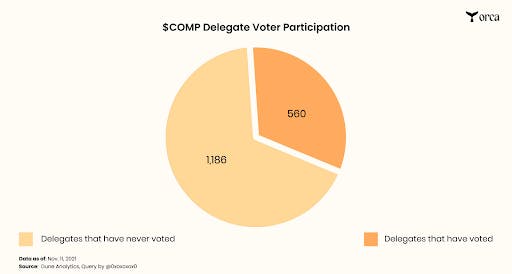
MakerDAO has made it easy to identify which delegates are actively participating with their dashboard. When it comes to redelegation, it is easier to identify if the delegates are worth delegating to again due to their activity.
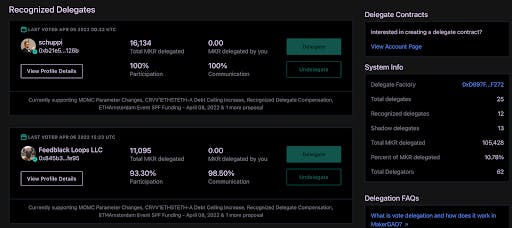
Plutocracy
I mentioned plutocracy earlier in this article, but this is a vital issue within governance. We want to avoid DAOs being controlled by the wealthy at all costs. People do not like the concept of the one token = one vote because that means whales who have more money can accumulate more tokens and have more voting power.
If plutocracy is not solved, then DAOs will be like a traditional business model with the name of a DAO. The whales can essentially act as a CEO if they have enough tokens or they could group up together to form the ultimate whale collective.
Many new models are being tested, such as quadratic voting, which might help tackle these issues, but this is a significant issue and will take a lot of time.
Conclusion
Governance is a very complex topic, and it continues to evolve daily, but it is a necessary topic that we need to explore safely. A lack of awareness of decentralised governance leads to vulnerabilities in this field, which can be exploited by malicious actors. A strong education of governance along with continuous development of decentralised governance will help us elevate DAOs higher than ever before.
I am excited to work on decentralised governance at StableNode and explore this topic further.
